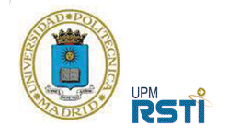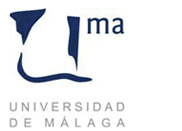Alcatel-Lucent provides communications solutions to Telecommunication Carriers, Internet Service Providers and Enterprises that distribute video applications, voice and data services to its customers and employees. Alcatel-Lucent offers its leading position in networks, land, air, space and underwater, terminals, applications and services for residential and corporate users and the whole cycle of activity (design, installation, operation, maintenance and management of networks and services).
With 58,000 professionals and sales of 13.135 million euros in 2005, Alcatel-Lucent operates in over 130 countries. Alcatel-Lucent has 950 employees in Spain (2009) 25% of which dedicated to R & D.
Within the MONOLOC Project, Alcatel-Lucent will be the technical and management leader as well as playing an important role as far as the technological development is concerned. Alcatel-Lucent will ensure not only the innovative nature of the proposal but also the possibility to offer an effective and sustainable solution that meets the requirements and expectations of the potential users.
Its experience as relevant technological innovation center involved in Projects in the areas of infrastructure , digital services for public administrations, security and confidence, content management and usability and accessibility will ensure that the solution is fully focused and tailored to user needs. Alcatel Lucent also provides various patents covering the seminal idea of the project

Founded in 1989, The Universidad Carlos III de Madrid is one of the six public universities located in the Community of Madrid. This is a medium sized university (18,951 students) that has three campuses and offers 40 degrees including Law, Socio-Economic, Technical and Humanistic. Carlos III University of Madrid is one of 5 Spanish universities selected in 2010 for Campus of International Excellence.
The group involved in this proposal belongs to the Group of Telematic Systems Applications and Telematics Engineering Department of this university.
• The Department of Telematic Engineering University Carlos III of Madrid consists of a consolidated team of Doctors and Engineers in Telecommunications and Informatics experts in Information Technology and Communications working in various research areas. It has a long history of activity and proven experience, nationally and internationally, in research and development projects, training and consulting. These activities are performed for or in conjunction with industrial service companies and public administrations.
• The Group GAST (Group Telematics Applications and Services) from the Department of Telematics Engineering is a research group recognized by the University Carlos III of Madrid and the CAM, which is organized in 5 lines of research, called laboratories:
- - Ubiquitous Computing Lab
- - Web Technologies Laboratory.
- - Intelligent residential Environments Lab.
- - Laboratory Real-Time Systems.
- - Tele-education lab.
In the past five years the group has participated in 12 European projects, 18 national and 5 business collaboration projects. He has published over 50 articles in journals, 8 publications in books and over 100 papers in conference.
En temas relacionados con esta propuesta, el grupo lleva 10 años investigando en la línea de computación ubicua en temas relacionados con continuidad de servicio, descubrimiento y composición de servicios, localización, seguridad, identidad y confianza en redes móviles e inalámbrica.
El grupo participa además actualmente en diversos proyectos de convocatorias nacionales relacionados con ésta temática, como CENIT (proyecto España Virtual, relacionado con tecnologías de localización) y Plan Nacional de I+D+i (proyecto CONSEQUENCE, relacionado con femtoceldas móviles), así como en un contrato con Telefónica I+D desde 2007 para investigaciones en diversas tecnologías relacionadas con la tarjeta SIM del móvil.
En el proyecto MONOLOC, el objetivo del grupo es investigar en aplicar las técnicas de localización que ha estado investigando en los proyectos anteriores en el ámbito de las redes UMTS, al caso de entornos de femtoceldas y de redes autogestionadas, para ofrecer localización en interiores a teléfonos móviles. También aplicará técnicas de predicción de localización a partir de conocimiento obtenido de comportamientos pasados.
On issues related to this proposal, the group has spent 10 years researching the line of ubiquitous computing on issues related to continuity of service discovery and service composition, positioning, security, identity and trust in mobile and wireless networks.
The group also participated in various projects currently national calls related to this subject, as CENIT (Spain Virtual Project, related to location technologies) and Plan Nacional de I + D + i (Consequence project, related to mobile femtocells) and has a contract with Telefónica I + D since 2007 for research on various technologies related to mobile phone SIM cards.
In the Monoloc project, the research group's goal is to apply the localization techniques that have been investigated in previous projects in the field of UMTS networks, the case for femtocells environments and self-managed networks to provide indoor location for mobile phones. Also it will apply localization prediction techniques from knowledge gained from past user behavior.
GRUPO INNOVATI is a technology company focused on innovation, engineering and development, with the clear intention to provide solutions for the current needs of businesses in the area of Information Technology and Communications, particularly in the area of mobile applications.
Today INNOVATI is an independent company, 100% Spanish with more than 250 employees in our various branches in Spain Brasil and Mexico. Our staff is composed by 90% of qualified multidisciplinary personnel , mostly with engineering degrees in different branches.
INNOVATI collaborates with leading companies in the sectors of telecommunications, information systems and with national and foreign universities and research centers and on the forefront of technological innovation in Europe and America, thereby achieving a first-hand knowledge of the latest business technology and R & D + i solutions.
In this aspect Creative IT provides IT solutions in the following lines:
- Security: Radio, TV and Multimedia: Mobility: Business: Accessibility Solutions.
Within the project MONOLOC, Creative IT will play an important role as far as technological development is concerned, in order to ensure not only the innovative nature of the proposal but also able to offer an effective and sustainable solution that meets the requirements and expectations of potential users. This base will serve as the relevant technology experience as an entity within the project INREDIS (Interfaces relationship between the environment and people with disabilities). INNOVATI will also provide knowledge and experience gained in European initiatives such as Smart Urban Spaces (SUS) on issues of digital services for public administrations, security and confidence, content management and usability and accessibility, to ensure the Thus the solution is fully oriented and tailored to user needs.
- Role in Project:
- - Development Platform for QoS and Network Management Agent.
- - Mobile Application Development.
- - Platform Business exploitation and Market Analysis
The Microwave and Radar Group (GMR), is integrated into the Department of Signals, Systems and Radio of the Universidad Politécnica de Madrid. This research group has extensive experience in the design, simulation, and circuit development of high frequency subsystems and systems. Similarly, the GMR have open lines of research: a) analysis, simulation, evaluation and specification of wireless communication systems, mobile phones and radar. b) Development of adaptive antenna systems for various applications: mobile communications, GPS receivers and anti-jamming radio links, d) Measures of propagation and planning and deployment of radio systems in the bands of wireless communications (WiFi, WiMAX) and LMDS systems in 28GHz. to 40GHz bands. e) Design of signaling and communications subsystems for transport applications.
-Role in Project:The lines of work of the Research Group of the Polytechnic University of Madrid (UPM) in the project Monoloc are closely related to the provision of positioning services on 3G networks or LTE femtocells. The UPM will focus its efforts on providing positioning services not only in conventional networks, but also self-configuring networks (SON).
To this end, the research group will analyze, develop and implement radio propagation models suitable for indoor environments femtocell network deployment, whether or not self-configurable.
On one hand, these models will be implemented in a radio propagation simulator indoor propagation. This simulator will be used in the calibration phase of the algorithm or algorithms developed in this project, in order to minimize the cost of performing the calibration phase. In collaboration with other participants, we will develop a protocol for testing, simulation and measurement campaign, to validate the propagation model implemented.
Another line of research in this project is to develop software for planning and dimensioning of femtocell networks that are geared to provide joint services for voice, data, video and localization in indoor environments, with particular attention to the requirements of the provision of such services.
The University of Malaga (UMA) is a public university with nearly 40,000 students and 2,000 teachers. Recently the University of Malaga, together with the University of Sevilla, has received the label of "International Campus of Excellence" for the joint project AndaluciaTech. One of the areas of specialization of AndaluciaTech is communications, with special emphasis on mobile communications.
The Communications Engineering Group (Grupo Ingeniería de Comunicaciones GIC), is one of the largest in UMA, with over 80 members. Its activities cover many areas: wireless communications, digital signal processing, optical communications, etc.. The group has strong ties with leading ICT companies of the Technologic Park of Andalucia (PTA), both through collaborative projects and the training of current and future employees of those companies. Within the GIC, the team that is dedicated to topics directly related to the project Monoloc consists of 10 people, with over 10 years experience in management and optimization of mobile communication networks: MobileNET.
Role in Project:
The research will be focused on Self-Organizing Networks (SON). Particularly self-optimization and self-healing techniques will be studied. Self-healing will face loss or degradation of service, including functions for detecting and diagnosing faults and mechanisms to mitigate such loss of service. Self-optimization will focus on auto-tuning of handover parameters for load balancing or optimizing network performance.






